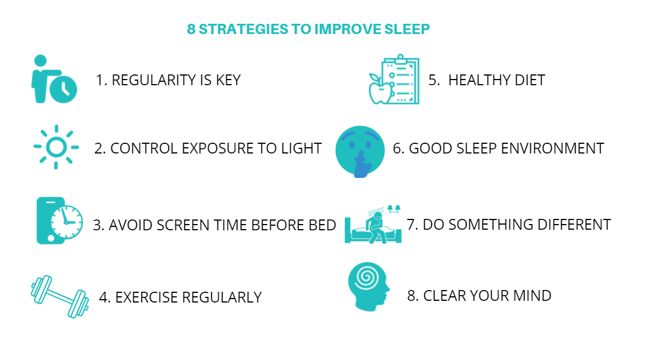Why Sleep is important to our health
As the old saying goes, “a good laugh and a long sleep are the best cures in the doctor’s book…”
Why sleep is important to our health
Over the past 10 or so years, research has overturned the notion that sleep loss has no health effects, apart from daytime sleepiness. This is not true. Sleep loss (less than 7 hours of sleep per night) has wide-ranging effects on the cardiovascular, endocrine, immune and nervous systems, including the following:
- obesity in adults and children
- diabetes and impaired glucose tolerance
- cardiovascular disease and hypertension
- anxiety symptoms
- depressed mood
- alcohol use
Sleep and dementia risk
The National Sleep Foundation guidelines state that people should be aiming for an average of 7-9 hours of sleep each night. An extensive British study of 8000 adults found that individuals aged 50 or 60 were at a 30% higher risk of dementia if they were consistently sleeping 6 or less hours a night compared to their age-matched peers who slept 7 hours a night. This is because sleep acts as our sewerage system. It allows our body to remove toxins and flush away over-build up of proteins such as beta-amyloid (a hallmark characteristic of Alzheimer’s Disease) that naturally forms during the day.
How does sleep deprivation impact our health?
- Central nervous system: is your main information highway. Sleep deprivation impacts the ability of our nerves to send and receive signals due to the brain’s exhaustion.
- Immune system: when you sleep, your immune system produces protective antibodies and cytokines. It is these things that fight foreign viruses and bacteria. Hence, lack of sleep stops our body from building its defensive forces.
- Digestive system: Sleep affects the levels of two hormones, leptin (tells the brain you are full) and ghrelin (stimulates appetite or hunger). Additionally, sleep deprivation causes you to release less insulin after you eat.
- Cardiovascular system: Sleep plays a vital role in your body’s ability to heal and repair blood vessels and the heart.
- Endocrine system: Hormone production is dependent on your sleep. E.g., waking up at night can impact the hormones you produce, including our growth hormone. For testosterone production, you need at least 3 hours of uninterrupted sleep.

10 tips from Matt Walker
Sleep scientist Matt Walker presented a very compelling TED talk titled “Sleep is your Superpower”. This talk does a great job of answering why sleep is important to our health.
Some key take home points from this talk were that:
1. Sleep is your life support system and mother nature’s best effort at immortality.
2. Men who routinely sleep just 4-5 hours a night will have a level of testosterone which is that of someone 10 years their senior.
3. You need sleep after learning, to hit the save button on new memories, so that you don’t forget.
4. You also need sleep before learning, to prepare your brain, almost like a dry sponge ready to initially soak up new information.
5. Without sleep, the memory circuits of the brain become waterlogged, as it were, and you can’t absorb new memories.
6. Your hippocampus acts as your brain’s email ‘inbox’. With sleep deprivation, signals are not being sent to the hippocampus and instead are ‘bouncing’. The consequence of this is that the brain cannot effectively commit new experiences to memory.
7. We have discovered that a physiological signature of aging is that your sleep gets worse, especially that deep quality of sleep.
8. Direct current brain stimulation involves inserting a small amount of voltage into the brain, so small you typically do not feel it, but it has a measurable impact. In young healthy adults, this stimulates deep-sleep brain waves, almost doubling the amount of memory potential as a result of improved sleep. This is a potential avenue that is currently being explored for older adults, particularly those with dementia.
9. The link between a lack of sleep and cancer is now so strong that the World Health Organisation has classified any form of night time shift work as a probable carcinogen because of how it disrupts sleep-wake rhythms.
10. There’s a simple truth: the shorter you sleep, the shorter your life.
To view Matt Walker’s TED talk, click here.
Strategies to improve sleep and overall health
1. Regularity is key: go to sleep and wake up at the same time everyday. Avoid sleeping in, even on weekends and be smart about your naps.
2. Control your exposure to light: expose yourself to bright sunlight in the morning. Spend time out in the sunshine during the day. Also, make sure the room you are sleeping in is dark.
3. Avoid screen time before bed: avoid screen time within 1-2 hours of going to bed. That means no late night TV.
4. Exercise regularly: 30 minutes of moderate aerobic exercise has been found to lead to better sleep that night. Even as little as a 10 minute walk per day improves sleep quality.
5. Have a healthy diet: avoid sugary foods, alcohol, caffeine, nicotine and big meals late at night. The more liquid you drink close to bed can also result in more bathroom breaks during the night.
6. Improve your sleep environment: make sure you are in a cool room. Research suggests 18 degrees celsius is desirable for most people to get to and stay asleep. Make sure your bed is comfortable and noise is kept to a minimum.
7. If you are laying in bed and struggling to sleep, go to a different room or do something different.
8. Clear your mind: practise deep breathing and clearing your mind of any worries.
We hope you can now see why sleep is important to our health. The research on sleep and our overall health and memory is astounding. It highlights why it is important to lead a healthy lifestyle in order to achieve good sleep. The truth is, without good sleep our bodies cannot function at their peak. Without this, the body breaks down, resulting in muscle injury, issues concentrating when it comes to daily tasks or other preventable accidents.
At Urban Well, we facilitate your health through our various services, which aim to get you back on track to sleeping better. Let us help you manage the physical, social and mental stressors in your life. Contact us today to find out more about what we do.
Call us on (07) 3310 4494.

References:
https://www.sleephealthfoundation.org.au/pdfs/surveys/SleepHealthFoundation-Survey.pdf
https://www.ted.com/talks/matt_walker_sleep_is_your_superpower/transcript?language=en#t-211061
https://www.helpguide.org/articles/sleep/getting-better-sleep.htm
https://www.healthline.com/health/sleep-deprivation/effects-on-body#Treatment-for-sleep-deprivation
